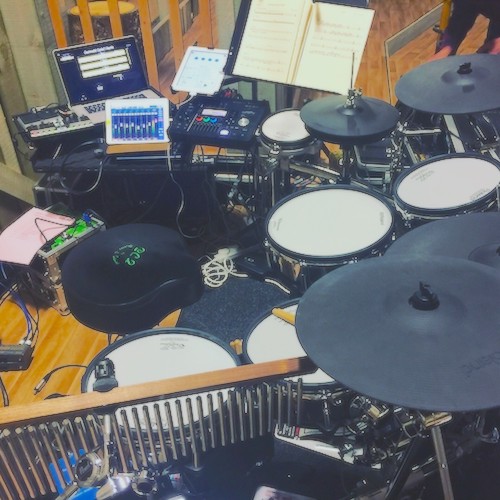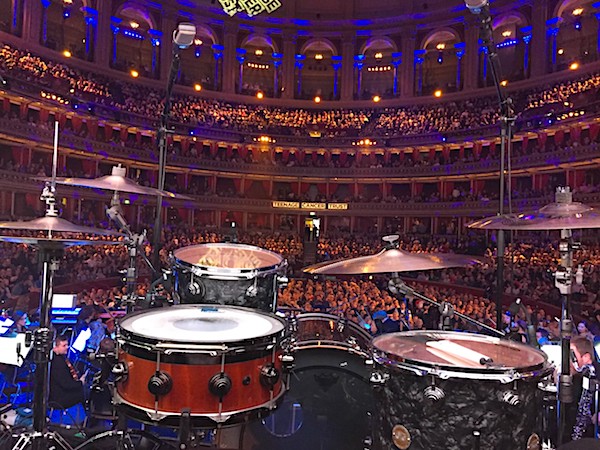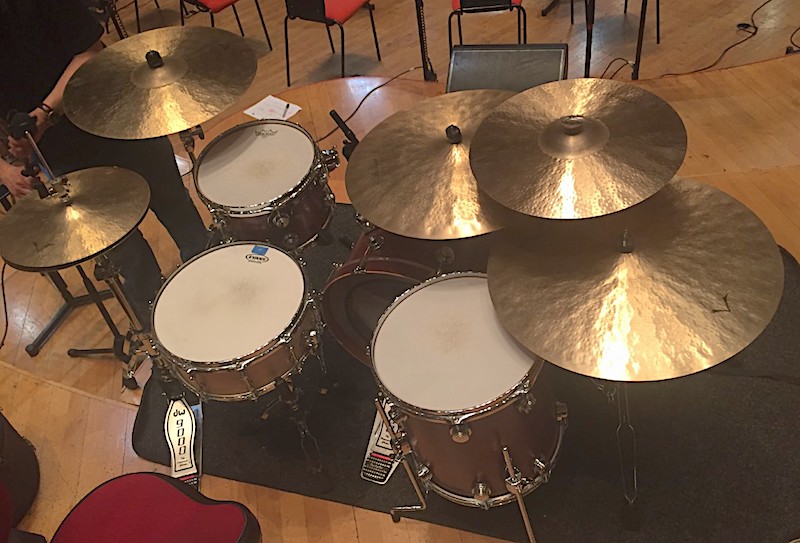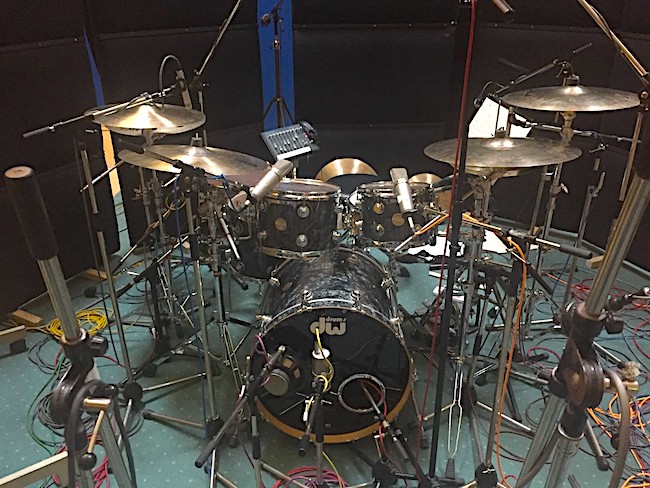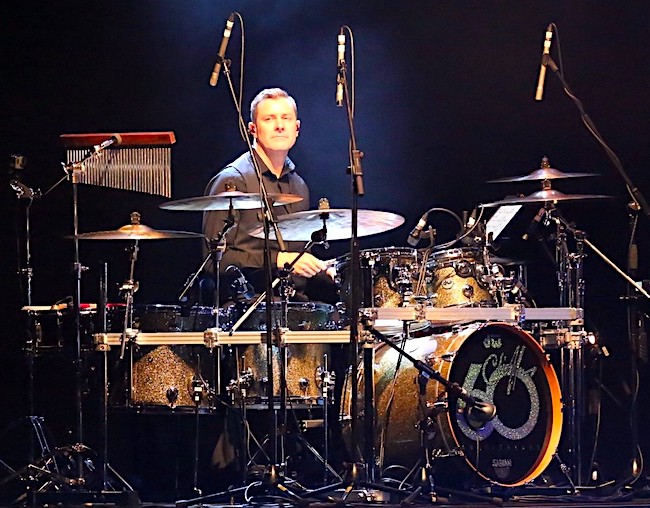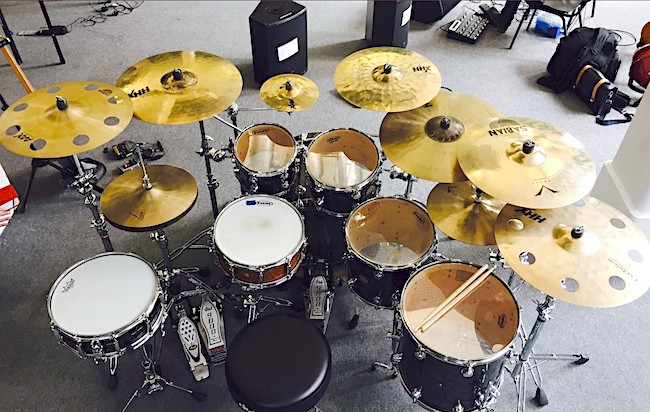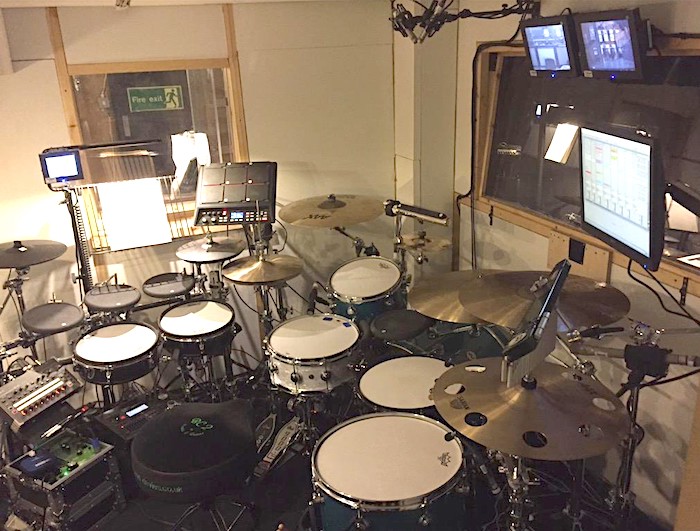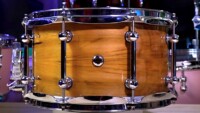London’s West End is a unique place. With over 15 million visitors and more than 18,700 shows performed in 2018, this little half square mile of London undoubtedly is the world’s capital of musical theatre. While this is great for tourists and musical theatre fans, it’s even better for us – drummers – because it means work.
In a time where session work is steadily receding a secure drum chair in one of London’s theatres is more than appealing than ever. But how does one make a move into the scene? What are the challenges awaiting?
I sat down with some of London’s top West End drummers to find out.
And who better to start with than…
Andy McGlasson
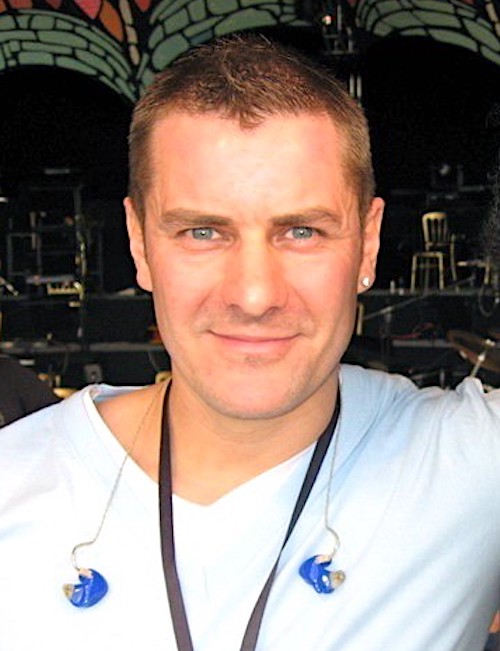 School of Rock – Kinky Boots – Groundhog Day -The Bodyguard – Hairspray – Ghost – Made in Dagenham – Saturday Night Fever – The Producers – Tell Me On A Sunday – Jesus Christ Superstar – Evita – The Full Monty – Spamalot – The Beautiful Game – Charlie and The Chocolate Factory
School of Rock – Kinky Boots – Groundhog Day -The Bodyguard – Hairspray – Ghost – Made in Dagenham – Saturday Night Fever – The Producers – Tell Me On A Sunday – Jesus Christ Superstar – Evita – The Full Monty – Spamalot – The Beautiful Game – Charlie and The Chocolate Factory
Born and bred in Scotland, Andy discovered a passion for rhythm by tapping along to his fathers records at a young age and it’s thanks to his supportive parents that he soon went for his first drum lessons. “I just stumbled into it – as everything in my career really”, he explains.
Over years of learning the basics and practising every day he found a passion for jazz in his young teens, which became his genre of choice and soon saw him playing jazz festivals abroad and all over Scotland. Being taught early on to keep an open mind and study different types of music he also started playing along to pop, rock, country and found himself in various amateur dramatic shows and school productions of musicals. At the time it just felt like another area to try out, not a career choice.
Having dipped in and out of the pop world for 10-15 years Andy just couldn’t get comfortable with the idea of ‘only working when your act is working’ and wasn’t satisfied with the precarious work. Theatre on the other hand was the one stable thing that kept cropping up and presented itself with Andy’s first big break at the age of 21 – a production of Les Miserables.
Over the years Andy has performed with artists such as Lady Gaga, Beyonce, Lionel Richie, Tinie Tempah, Take That, Michael Bublé, One Direction, Paloma Faith (to name but a few) but always had his career anchored firmly in the West End.
Currently he can be seen (well, more heard than seen) in the West End production of School of Rock and at Evita in the Regents Park open air production.
Outside the musical theatre world he is the touring drummer for Cliff Richard as well as busy doing sessions, TV shows and orchestral dates.
How did you start getting work in the West End?
My first big break came when I was 21 and somebody recommended me to dep (deputise) on a touring production of Les Miserables that came to Edinburgh. I went to sit in and there was a huge orchestra and a man with a baton waving his arms about – I had absolutely no idea what was going on and at the time, it was way outside my musical comfort zone. I had to sit in four or five times and then keep practising it as much as I could. I remember being absolutely petrified during my first show. I felt so underprepared and yet I couldn’t have practiced any more. I had initially been asked to cover only for a few weeks but I distinctly remember planning another career during the interval of my first performance because I was so convinced that the first half had gone really badly. At the end of the show the MD came to see me, patted me on the back and said “fantastic job, see you tomorrow”. I couldn’t believe it. I thought that was my one opportunity and I had blown it.
That’s how I got into proper musical theatre. I then started doing touring shows but always knew that if I wanted to do it properly, I would have to move to London.
I finally got a chance thanks to the fixer of a touring production that I was playing at the time. He was also contracting a show in the West End (Saturday Night Fever at the London Palladium) and needed a drummer to take over from Neal Wilkinson, who was doing the first eight weeks.
Just prior to that though, I remember coming to London to sit in with Ralph Salmins. This was just before I officially moved into town. I didn’t really know who Ralph was at that time and I thought he was just a regular show drummer. It was such a rude awakening because I suddenly thought: ‘Oh my god, this guy is world class and I’m not!’. I remember thinking: if this is how good you have to be to compete in London, I might as well go back home to Scotland.
I literally had a couple of days of head-scratching debating with myself what to do. I knew that I didn’t have his ability, his technique or anywhere near his musicality. However, I flipped it on its head and thought rather than being put off by it, use it as a source of inspiration. So I came down and once again prepared as much as possible for my West End debut.I remember playing that first show and I received a round of applause from the band at the end of the night. From that point it literally opened some doors and I got recommended to a lot of other musicians and fixers. That was my first.
What are the main challenges of playing in musical theatre?
First and foremost it’s being able to get it right stylistically. School of Rock is what I would call an ‘anthem rock’ musical. All the tunes are quite melodic but you still have to dig in and hit the drums hard and stay in the 80s rock genre. However, to be successful and have the best chance of employment, you really need to be versatile. It’s also really important to play what’s required for the show and not what you fancy doing just because you can. I’m not a monster chops fiend on the drums and very rarely am I required to be either. On some shows I’m afforded a degree of interpretation and on others I have to play exactly what is written (even if I don’t think it sounds as good!).
To be a good dep, ideally you need to sound just like the regular drummer. The most successful ones are those that don’t try and impress everybody with their latest inappropriate YouTube drum lick. It takes a great deal of discipline to play consistently on eight shows a week. The temptation is always there to try something different but one has to always be respectful to the music and of course the staging.
I’ve been lucky to have played so many different styles of shows, that’s what I love the most about this part of the industry. From pop music to swing or heavily conducted orchestral playing, you need to be able to cover it all. I’ve even had to play a big band drum solo on a revolving stage dressed as a giant groundhog with in-ear monitoring and no sight of the musical director… like I said, variety!!
Having a good temperament is vital too. It’s all about what you bring to the party. You’re in such regular, close proximity with the same bunch of players, it’s important to get on with people.
A lot of drummers won’t be used to working with a conductor. What are the challenges there?
It’s an art form and a science without any concise formula!
It’s not so much ‘following’ a conductor that’s important but you have to be able to read a conductor, and that’s a big difference. Sometimes if you follow religiously what’s being given, you won’t be in the right place musically. You just have to be able to read what’s required, when to follow and when to ignore.
Some conductors let the drummer / rhythm section lead, others will want to be dictating exactly where the time is. In more traditional shows, the time might ebb and flow so you have to be prepared to move with what’s being given. Usually it’s against our nature as drummers to speed up or slow down in the middle of a song but there could well be a whole number of reasons why artistically this needs to happen. Most likely a dance routine might require a bit of forward motion or perhaps a dramatic acting moment may need the piece to slow down. Depending on the style of show and size of orchestra, various sections such as the strings or brass might interpret the time slightly later so you have to be aware of that.
On a West End show you also sometimes have two, three or four people who will musically direct the show at some point and they might all do it slightly differently.
You can’t just go from having never worked with a conductor to trying to play with a symphony orchestra. I’d suggest finding a local amateur orchestra or a show and use it as practise. The more shows you do, the better you’ll get at it. I had never worked with a conductor when I played my first show. I’m much better at it now but still, sometimes it simply looks to me like a man is being attacked by a swarm of bees! It really can be a bit of a guessing game but the more experience you have, the easier it becomes.
What’s your advice for players who want to prepare themselves for working in musical theatre?
My advice would be to seek out those amateur productions, dance school shows etc and get involved. Get in touch with players on a show and politely ask to sit in. All the drummers I know in the West End get regular requests for this, as long as there is no hustling for work, it’s generally accepted. As a teenager I benefited hugely from sitting next to other professional drummers. If necessary, be prepared to go on the road with a touring show.
When I lived in Scotland I ended up doing a tour of Cats. I covered some shows when it came to Glasgow; and when it transferred to Newcastle and then consequently Southampton, I made myself available as a dep. It was for Dave Adams (who is now the drummer on Lion King) and he said he couldn’t really justify me coming all the way down to Southampton but I told him not to worry about that. He paid the gig fee, I payed my own expenses and made my way to wherever the show was on because it was an amazing experience and a great opportunity for me to learn. I eventually took over from him on that tour so it was clearly a sound investment at the time.
Also make sure that when (and if) a call comes out of the blue, you’re musically as well educated as you can be. Don’t wait for it to land in your lap and then think “Oh bugger, I should have listened to certain types of music”. Learn it now and be prepared! All my biggest breaks have come out of nowhere, not just shows but high profile gigs, sessions or TV shows too. There’s nothing worse than being booked for something then panicking that you’re going to be found out…..mind you, that’s how I felt for most of my career!!
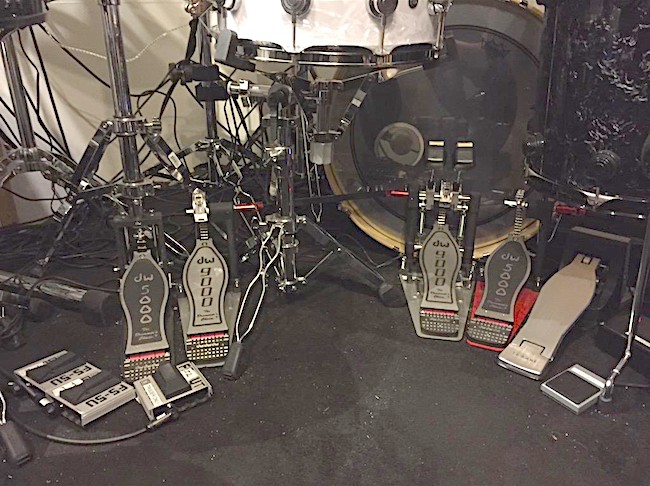 How important is it to have a solid knowledge beyond ‘just’ the drum set? For example percussion, tuned percussion or electronics?
How important is it to have a solid knowledge beyond ‘just’ the drum set? For example percussion, tuned percussion or electronics?
Having an understanding of how electronics work is definitely helpful. Shows can nowadays use electronic drums, loops, triggers etc. In Kinky Boots for example I had a hybrid acoustic and electronics kit with various trigger pads and a bonkers amount of pedals. I had to fire all the clicks and loops for the show via Ableton which made it a bit tricky logistically but it really worked musically and was great fun to play.
I never went to music college and I only play a basic level of handheld percussion, but I know a lot of guys who can do both. I’ve managed to make a career solely from playing drums however there are definitely some shows I simply couldn’t do as there may be too much tuned percussion. In the early stages of a show coming together, you might get asked to play for a ‘workshop’. It’s essentially a try out, scaled down version where you might just get a copy of the piano/vocal score because the drum parts haven’t been arranged yet so being able to create something that works as a demo from this information, or lack of it requires a bit of creativity.
Over the years, I’ve also worked quite closely with choreographers who may want a specific groove, pattern or fill written into the music to fit with a dance routine. That can become a test of my deciphering skills as dancers tend to work in counts of eight (regardless of the time signature!). You need to be able to add accents or hits at random places within the drum score. They also have a unique way of naming certain sections of music to replicate what’s happening in the dance routine. For us mere drummers it’s never “Can we go from bar 57 or letter B, it’s more likely to be, “let’s go from the traffic lights, under tempo, full out, here we go, 5, 6, 7, 8”……and you have to able to pick up from where they mean and have your wits about you.
You play eight shows a week. How do you keep it fresh and interesting for yourself?
Playing a show is a bit like doing a session playing the same music, with the same people at precisely the same time in exactly the same venue, so as you can imagine, it can sometimes be a bit arduous. It doesn’t matter how much you enjoy the music, simply by it being so repetitive, it can on occasions become a bit of a challenge. We’re human beings, not machines so you’ve got to keep fresh.
I’ve know of musicians who started long running shows being fantastic players and by the end of the run their technique has suffered and their whole enthusiasm and reason for playing music in the first place has gone. That’s partly because you can easily get sucked into a world of well paid regular work without taking enough time out.
You just have to find a way of making it work for yourself and staying hungry. I’ve been fortunate enough to be playing in the West End for 21 years now and there are loads of very capable drummers all eager for a show, so you have to retain some kind of passion otherwise it will show in your playing.
You also have to be mindful how much money theatre tickets cost these days, for some shows it’s upwards of £100 so you can’t just turn up and decide that you can’t be bothered. That’s the harsh reality. It can be really tough – especially if you’re doing show number 432 and you’re a bit knackered. You somehow have to dig out a performance and remain committed. I try and do as many things as I can things outside of the show even if it means earning less or no money! If I have no other gigs coming in, I take time off anyway, simply to recharge my batteries.
How does being on stage compare to being in a pit?
I would be on stage for every show if I could. I mentioned earlier about having to put in a performance. I find it so much easier when there is some sort of connection with the audience members and of course the cast. Being in a darkened room with no other human contact waiting for the next downbeat on a monitor can be a lonely place. Sure you get used to it but even although you may hear an audience response, you can’t always feel the energy. I always ask for a video screen of the stage if I’m in a drum booth, it helps to make me feel part of what’s going on.
Also, it still happens that audience members put their head over the pit and are surprised that there are real living people down there! I think the more the public realise that there are live musicians, the more it helps to preserves the cause going forward. I believe the more musicians are employed the better. We’re a dying breed and the more the audience can see and appreciate us, has to be a good thing.
How has technology changed working in the West End?
There’s a brilliant black and white photo at the London Palladium from decades ago showing a massive orchestra all crammed into an open pit, with quite a few of them smoking!
Now orchestra pits are basically pop-up studios. We have luxurious booths with air conditioning, we have mixers to mix our own headphone sound, I have video screens of the stage and the conductor. I can hit the drums as loud as I want and have nice reverb sounds coming back to me in my ears. It can be a very comfortable place to work.
The use of click tracks has become more prevalent. Not that long ago we only had click tracks for songs that kept the same tempo all the way through, nowadays they’re up and down. I did an arena tour of Jesus Christ Superstar where the click was tempo-matched to a pre-recorded orchestra. It moved about a lot and made it actually quite tricky and slightly uncomfortable to play to, but for the overall product it worked really well. There can also be a lot of automation. On one show I did, the keyboard player triggered not only piano/synth sounds but also commands that changed the lights and some of the automated staging.
Musical theatre certainly won’t be for everyone. It takes a certain type of discipline, commitment, experience and musicality to perform it well. Years ago, doing shows was almost frowned upon and the quality of orchestras was much lower. There used to be so much more session work and lots more dance band work that it was pretty much the lowest rung of the ladder. Nowadays, things have changed, live dance bands are pretty much extinct and session work isn’t nearly as prevalent so the demand for a chair on one of London’s top shows is huge. It’s certainly one area of the music business that keeps on growing and growing. Consequently there are many productions not just in the West End but up and down the country too. If it’s something that appeals and you get a chance then I encourage everybody to try and play on a show at least once. I’ve had the most amazing experiences, not just playing music with some fantastic musicians but also meeting and working with composers, producers, actors etc. There are many stories to tell… but they will have to wait for another day!
Thanks a lot for your time Andy!
Interview by Tobias Miorin
September 2019


